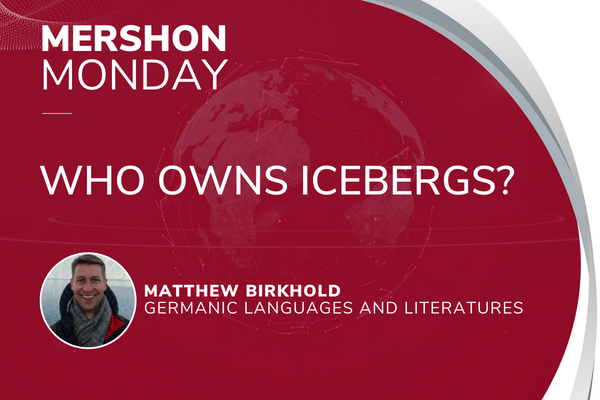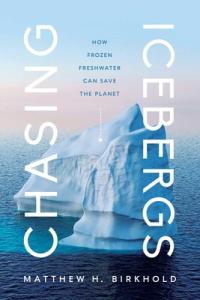
Hosted by the Mershon Center for International Studies
The global water crisis is upon us. 1 in 3 people do not have access to safe drinking water and nearly 1 million people die each year as a result. Luckily, there is a solution where we least expect it. Thousands of icebergs—frozen mountains of freshwater—are calved each year and sent into the oceans. Harvesting icebergs may be the key to saving the planet, but it is unclear who owns the resource. The answer is not just legal, but depends on our deeply held cultural, philosophical, and environmental beliefs.
Matthew H. Birkhold is an associate professor of German at The Ohio State University, where he also teaches in the Moritz College of Law. His first book, Characters before Copyright (Oxford 2019) explores the ownership of fictional characters. His writing has appeared in the New York Times, the Atlantic, Foreign Affairs, and Indian Country Today.

The global water crisis is upon us. 1 in 3 people do not have access to safe drinking water; nearly 1 million people die each year as a result. Even in places with adequate freshwater, pollution and poor infrastructure have left residents without basic water security. Luckily, there is a solution to this crisis where we least expect it. Icebergs—frozen mountains of freshwater—are more than a symbol of climate change. In his spellbinding Chasing Icebergs, Matthew Birkhold argues the glistening leviathans of the ocean may very well hold the key to saving the planet.
Harvesting icebergs for drinking water is not a new idea. But for the first time in human history, doing so on a massive global scale is both increasingly feasible and necessary for our survival. Chasing Icebergs delivers a kaleidoscopic history of humans’ relationship with icebergs, and offers an urgent assessment of the technological, cultural, and legal obstacles we must overcome to harness this freshwater resource.
Birkhold takes readers around the globe, introducing them to a colorful cast of characters with wildly different ideas about how (and if) humans should use icebergs. Sturdy bureaucrats committed to avoiding another Titanic square off against “iceberg cowboys” who wrangle the frozen beasts for profit. Entrepreneurs selling luxury iceberg water for an eye-popping price clash with fearless humanitarians trying to tow icebergs across the globe to eradicate water shortages.
Along the way, we meet some of the world’s most renowned scientists to determine how industrial-scale iceberg harvesting could affect the oceans and the poles. And we see firsthand the looming conflict between Indigenous peoples like the Greenlandic Inuit with claims to icebergs and the private corporations that stand to reap massive profits.
As Birkhold shepherds readers from Connecticut to South Africa, from Newfoundland to Norway, to Greenland and beyond, he unfurls a visionary argument for cooperation over conflict. It’s not too late for icebergs to save humanity. But we must act fast to form a coalition of scientists, visionaries, engineers, lawyers and diplomats to ensure that the “Cold Rush” doesn’t become a free-for-all.
Purchase the Book from Simon and Schuster
About Mershon Monday
Mershon Mondays encourage Ohio State researchers in different disciplines, career stages, and professional networks to share ideas and perspectives on global security questions. A light lunch is served. Given a strong response in the fall, we're now requesting advance registration.
